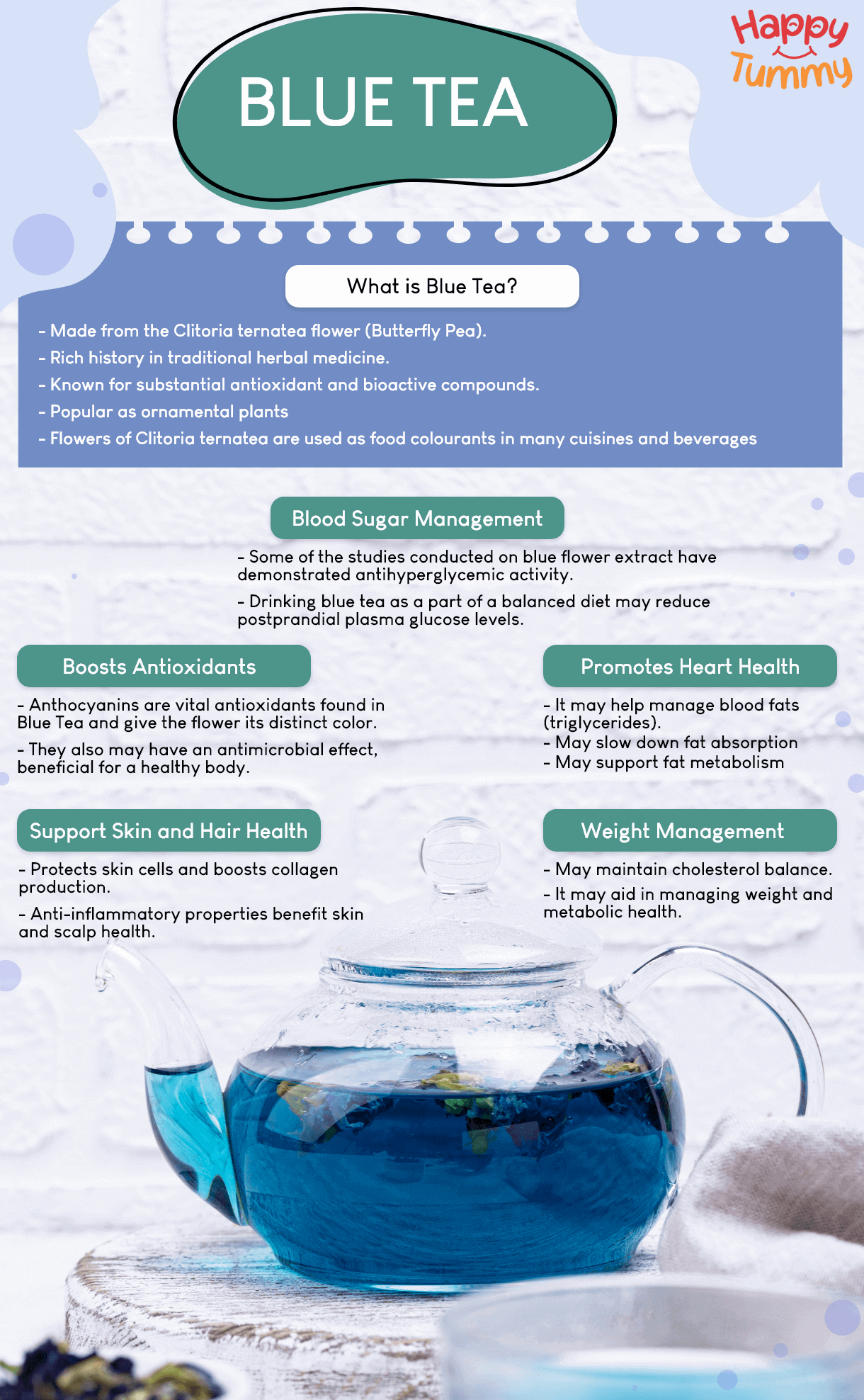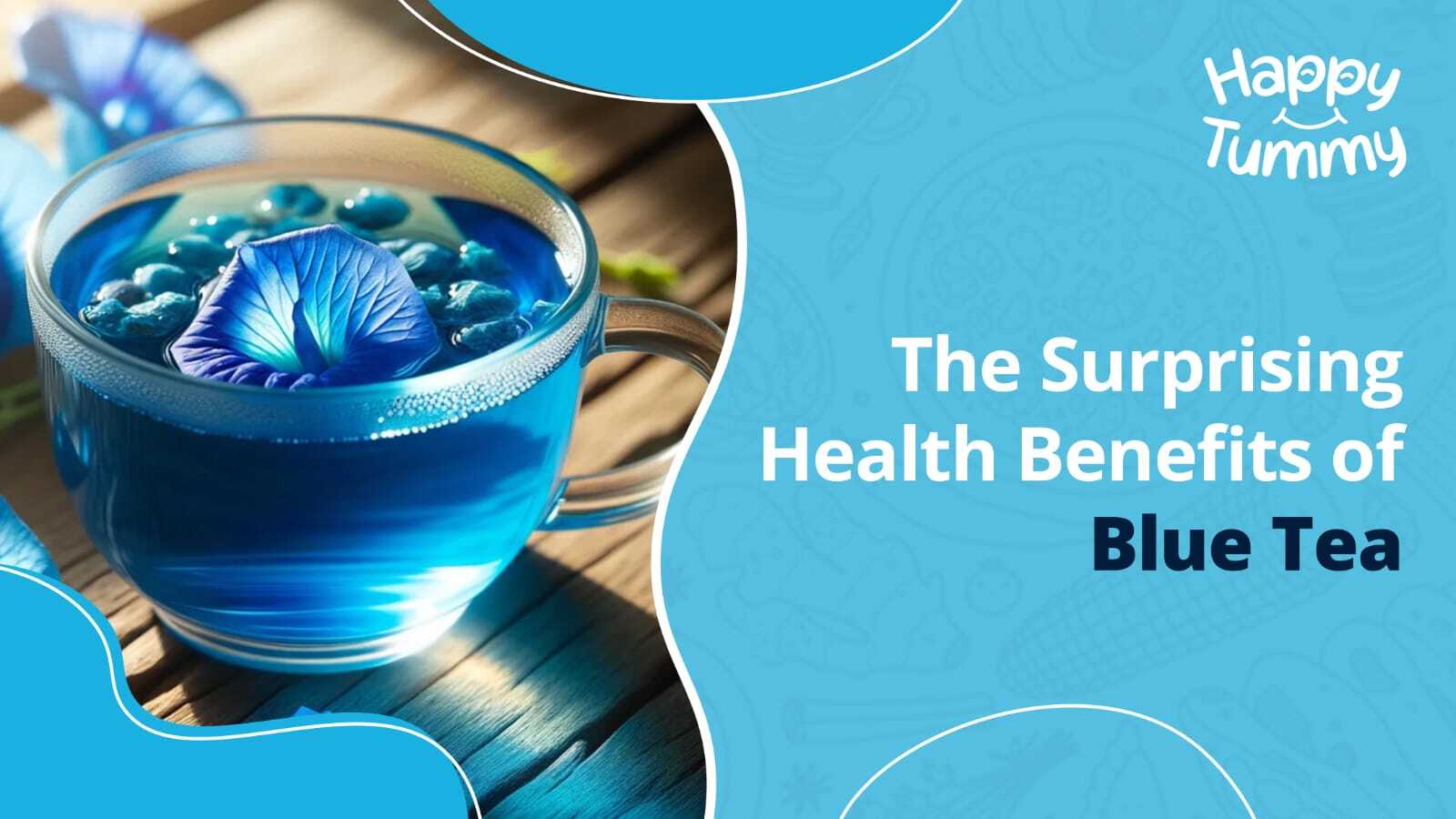Table of Contents
If you consider yourself a tea lover, your default beverage usually may be milk or black tea. However, what if we told you there’s another variety of tea, Blue Tea, which is worth considering for good reasons indeed?
Blue Tea is associated with numerous health advantages. Its anti-inflammatory, anti-oxidant and various other health-promoting properties have helped them gain significant importance and recognition [1] and strengthen our bodies’ natural defenses [2].
Find out more about the advantages of blue tea and how it can add value to your health regime.
What is Blue Tea? [3]
- The flower from which Blue Tea is made is the Clitoria ternatea flower, otherwise known as Butterfly Pea plant.
- It has a rich history of application in traditional herbal medicine, and many studies support its use for its substantial antioxidant and bioactive compounds.
- They are also popular as ornamental plants, and the flowers of Clitoria ternatea have been and continue to be used as food colourants in many cuisines and beverages around the globe [4].
Benefits of Blue Tea

1. Boosts Antioxidants
Free Radicals are unstable molecules generated by various systems in our body. When free radicals become more than the body can control them, the system becomes unbalanced, and oxidative stress appears in the body.
Because oxidative stress and free radicals have been implicated in numerous diseases, consuming foods rich in Antioxidants becomes essential. Antioxidants are chemicals that interact with and neutralize these free radicals, thus preventing them from causing damage. [5].
As a result, drinking Blue Tea, which is high in antioxidants, might boost antioxidant levels and help fight oxidative stress [6].
Anthocyanins are vital antioxidants found in Blue Tea. They give the blue pea flower its distinct color [7]Besides being an anti-oxidant, they also may have an antimicrobial effect, beneficial for a healthy body. The major anthocyanins present in blue pea flowers is known as Ternatins. [8].
2. Blood Sugar Management [9]
- Blood sugar, or blood glucose, is the primary source of energy for the body, but maintaining its levels within a healthy range is vital for overall well-being. Integrating foods rich in natural antioxidants, such as fruits, vegetables, nuts, and whole grains, may be a beneficial part of diabetes management. [13]
- Some studies conducted on blue flower extract have demonstrated antihyperglycemic activity.
The phenolic compounds in the blue pea flower were reported to have an inhibitory effect on enzymes responsible for insulin secretion.
Hence, drinking blue tea as a part of a balanced diet may reduce postprandial plasma glucose levels.
So, if regulating your blood sugar is a key objective, Aashirvaad Sugar Release Control Atta could make an excellent choice to integrate into meal times. It is made from whole wheat flour mixed with pulse and legume flour, which makes it a low Glycemic Index aata.
It may help with a steady sugar release into the bloodstream, avoiding sudden spikes and supporting balanced energy levels throughout the day.
3. Promotes Heart Health [14]
It’s important to be mindful of our eating habits, as an unbalanced diet devoid of antioxidants, good fats, and other essential vitamins and minerals can be a risk factor for developing non-communicable diseases (NCDs), such as hypertension, hyperlipidemia and cardiovascular diseases (CVDs).
Being aware of what we consume may play a role in managing these conditions efficiently.
Free Radicals are constantly generated in the Cardiovascular System and act as signaling molecules, but when these free radical levels exceed the body’s antioxidant capacity, Oxidative stress appears which may facilitate the development of atherosclerosis by causing oxidation of proteins, lipids, promoting inflammation and vascular dysfunction [10].
The antioxidant activity of Anthocyanins present in Blue tea, may aid in protecting against these potentially deleterious effects of oxidative stress on the cardiovascular system, thus preventing the development of atherosclerosis and cardiovascular disease.
As you focus on managing heart health, understanding your current dietary intake, including fibre, can be helpful. Aashirvaad’s ‘My Meal Plan‘ test assesses how much fibre you’re getting in your everyday meals and offers a tailored plan to ensure complete nutrition aligned with the recommended intake. It’s a great way to take charge of your nutrition alongside your wellness goals.
4. Support Skin and Hair Health [15]
- Blue tea’s potential to protect skin cells [16] and boost collagen production suggests that it may support healthy skin and hair.
- This characteristic, combined with its anti-inflammatory properties, could benefit your skincare and haircare routines. It may further promote vitality and manage inflammation that affects the skin and scalp.
5. Weight Management [17]
- Blue tea is known to contain many phenolic acids and other flavonoids. Bioactive compounds, especially polyphenols, and flavonoids, are known to reduce inflammation and may play an important role in managing obesity.
- They might support cholesterol balance by promoting good cholesterol (HDL) in the body.
- Regular consumption of blue tea may contribute to better metabolic health and might help with obesity-related conditions like dyslipidemia.
First and foremost, let us take a glimpse into digestive health as we delve deep into the concept of Blue tea aiding its weight management role.
To discover your true digestive health needs, the Digestive Quotient Test provides you with an assessment of your gut health so that it is easier for you to understand what exactly may be missing or overloading your gut every day. It will serve as a starting point for better health and wellness.
Other Benefits of Blue Tea
- Supports brain health: High antioxidants in blue tea might protect the brain and help maintain neurological function [18].
- Good concentration and Memory: In Ayurvedic Science, it is known as a brain-boosting herb. The presence of acetylcholine, in this flower may boost cognitive abilities, improve memory, and support brain functions.
- Promotes restful sleep: Blue tea, with its rich antioxidant content, may boost melatonin levels, scavenge free radicals, and protect cells from damage due to oxidative stress all of which may aid in improving sleep quality [21].
- Acts as a relaxant: It is recognized as therapeutic and is studied to have stress-sinking properties. Thus, it may help interact with neurotransmitters in the brain and help manage stress, and promote relaxation. [22].
- Supports Digestion: Blue Tea has been traditionally used to support digestion. Its anti-inflammatory properties may help in soothing the digestive tract and promote better digestion. It is also reported to have diuretic properties, which might help increase urine production [23].
- Traditional medicinal uses: Blue Tea has been used culturally for centuries in Ayurvedic medicines as a remedy for various health situations such as indigestion, constipation and skin ailments [24].
- Pharmacological properties: Studies have reported that Blue tea may benefit blood platelet functions, blood vessel health, and diabetes management [25].
Personalized assistance is important, and with a dietician consultation, you can get expert advice and know what is best for you. Whether you’re finding reasons to add blue tea or seeking balance in your diet, Aashirvaad is with you as always; let our dietician help.
Side effects of Blue Tea
The general consensus is that blue tea, when taken in moderation, does not really cause any side effects for most people. But if you overdo it, especially if you have a sensitive system, there may be some mild digestive discomfort.
Including them gradually and in moderation is always the best idea so you can see how your body reacts.
Do check with your nutritionist if you are pregnant, breastfeeding, or on any kind of medication.
Conclusion
Whether consumed as functional foods or food supplements, blue tea might offer various potential health benefits, including antimicrobial, anti-inflammatory, and antioxidant properties. [26]
At the same time, keep in mind that the benefits associated with Blue Tea shall be optimally achieved when consumed as a part of a balanced and complete diet, and not as an isolated remedy. To get the best results with your blue tea, focus first on a healthful versatile diet with organic natural foods.
That way, you get to take advantage of its special properties while taking a holistic approach to wellness. Blue tea offers a refreshing blend of traditional roots and modern appeal. It might be just what you need to improve your health journey.
FAQs
In reality, blue and green tea have different functional properties and nutritional benefits. Blue tea is packed with anthocyanins, which may fight oxidative stress and support overall health in general. Blue tea is also known for its lively bright color and calming effects. Green tea is known for its distinct flavor and other benefits such as antimicrobial, anti-inflammatory and so on.
Make sure you consult with a health professional and do your analysis to see and understand what fits into your lifestyle or good health plan.
Well, if that makes you feel better, then yes. Blue tea is caffeine-free, and is reported to boost melatonin production. Thus, it may help calm the mind and improve sleep quality. That being said, people do respond to things differently. So, it is advised to consult your healthcare professional to best understand what suits you.
When paired with a healthy and balanced diet, blue tea might aid in maintaining your weight. Although the research is extremely limited, its antioxidant status and ability to manage inflammation is something that’s essential for managing weight. While all this is true, the fact of the matter remains that overall body composition changes take time. A multi-faceted approach should ideally include consistent physical activity paired with healthy eating habits and not just sipping blue tea.















